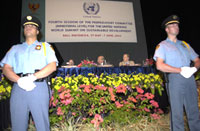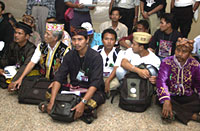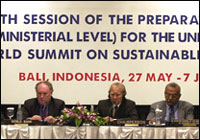Thousands of people have gathered on the resort island of Bali, Indonesia, to talk about poverty and environmental degradation in preparation for the August 2002 World Summit on Sustainable Development in Johannesburg, South Africa. Yet the big question among public interest participants here is not how to solve the world’s woes, but rather whether they should participate at all.
Cynicism is running high among nonprofit representatives. They arrived in Bali frustrated with the lack of progress in the 10 years since the World Summit’s predecessor, the Rio Earth Summit of 1992. As the negotiations proceed, the distinction is blurring between the current meeting, dominated, they say, by the “environmental axis of evil” of the U.S., Canada, and Australia, and events such as the World Trade Organization meetings that bolster the interests of multinational corporations.
Many of the nonprofit reps confess that they lack understanding of the governmental negotiations taking place behind heavily guarded closed doors at this posh resort’s convention center. Despite or because of that lack of understanding, they regard the process with suspicion, seeing it as an attempt to consolidate control for the powerful, or at the very least, an effort to avoid making hard commitments to help the disempowered, even if the meeting occurs under the benevolent rubric of “sustainable development.”
As an example of how morally bankrupt the negotiations are, Montree Chantawong, a Thai activist, points to the U.S. attempt to give corporations a stronger role in development. In Thailand, says Montree, who is deputy director of the Project for Ecological Recovery, petroleum companies have released heavy metals and other hazardous substances into the ocean, rendering ecosystems unsustainable. “But now they expect us to accept these companies as partners for sustainable development?”
Such unholy alliances have many people uncertain about whether they should even be involved in the meetings. “People are trying to decide whether they want to boycott or participate in a U.N. event that’s not yielding results,” says Kelly Jones of the San Francisco-based Earth Island Institute.
Some have already decided; a substantial number of activists voted with their feet and opted out of this final pre-Johannesburg event, where much of the agenda for August is being decided. Some view the meeting with such a sense of futility that they turned down all-expense-paid trips. The editor of an important Jakarta daily was invited to moderate a session on illegal logging. His response: “I did that 20 years ago, and how many millions of hectares have been cleared since then?”
Fording Ahead
Even many of those who did accept the free plane ticket were skeptical. Muayat Ali Muhshi, who is the national coordinator of Indonesia’s Consortium for Supporting Community-Based Forest System Management (the organization’s name is more pithy in Indonesian), says he regards such international meetings as “high expense, low impact,” while the grassroots work is “low expense, high impact.” He says that he hadn’t intended to come until he got an invitation by email along with financial support from the Ford Foundation.
Indeed, while groups that solicited support report that many foundations are tiring of the United Nations’ process, the Ford Foundation appears determined to single-handedly rescue the summit process on behalf of the people it’s supposed to represent. The foundation was instrumental in mobilizing the Indonesians who overwhelmingly dominate the NGO side of the event, known as the People’s Forum. “We’re funding 80 percent of the Indonesian People’s Forum process,” says the Ford Foundation’s Jeff Campbell
At Johannesburg, the Ford Foundation will likewise be underwriting a “World Sustainability Hearing.” Earth Island Institute, which is organizing the hearing, envisions a weeklong trial to probe the failure of governments to deal with poverty and the environment, and hopes the event will “inject a sense of reality and urgency to the summit by bringing delegates face to face with the people enmeshed in the critical problems that need to be addressed.” At a meeting Monday afternoon, however, organizers wrestled with the logistical barriers to actually winning face time with any decision-makers.
It’s a reasonable concern. In the spirit of post-Seattle summit meetings, access to the main meeting at Johannesburg will be tightly controlled. Public-interest events will take place at two locations, which will be a seven-minute and a 35-minute bus ride away. Organizers also discussed similar challenges for reaching journalists, who they fear will show up to cover the celebrities they are recruiting as media bait and disappear before any “grassroots people” can offer testimony.
Separation of Powers
Likewise in Bali, there’s little evidence that the NGO participants have any influence on the governmental negotiations. As an example of their success, activists point to a statement in the negotiating document about the importance of community-based forestry. But that entry includes no commitments for change or action. On Monday afternoon, a much-awaited one-hour meeting between NGO representatives and “high level delegates” was inexplicably cancelled at the last minute. An Indonesian information officer speculated that the delegates “were not ready.”
The U.N. hasn’t gone out of its way to demonstrate the ideals of participatory democracy. In addition to the fact that the negotiations occur behind closed doors, the delegates are largely absent from the NGO proceedings, and activists have little access. In a region where symbolism is paramount, government delegates shuttle between lavish four-star hotels in huge, largely empty, air-conditioned buses. Under the searing equatorial sun, activists squeeze onto benches in the back of over-sized pickup trucks.
And while the media presence here is scant, the U.N. is granting press credentials only to private and state-run news outlets. The alternative media is disregarded. After flying four hours from Bangkok, Timo Kuronen, a Finnish reporter for Kumppani Magazine, failed the U.N.’s journalistic acceptability test on two counts: His publication is not for profit and his letter of assignment stated that his magazine covered human rights, democracy, and the environment, which the U.N regards as advocacy work. “So a state-run newspaper can use the meeting as a vehicle for propaganda, but I can’t cover it because my magazine follows human rights issues and doesn’t take profits,” Kuronen griped.
A Lesson in Democracy
Despite the shortcomings of the summit, many Asian activists value the opportunity to network. Struggling for words, Montree, the Thai activist, exclaims “The People’s Forum looks happy.” He says that his organization is protesting an Asia Development Bank-led water privatization scheme that subsidizes corporations at the expense of poor farmers. He is eagerly comparing notes with colleagues from neighboring countries facing similar fights.
These are not jaded, jet-setting activists, and some of the NGO working groups have been impassioned events. One session featured an indigenous woman from the Philippines lambasting, in fluent English, corporations usurping her people’s native lands — the kind of information often presented at arms-length by cautious analysts in the U.S. As the woman spoke, a British woman and long-time Bali resident remarked to me in earnest that, “When you listen to this, you get the sense that there’s a huge war going, with corporations on one side and the villagers on the other.”
Indonesian participants say that the very existence of the People’s Forum is a positive development, and a sign that some progress has been made since the Rio Summit. The gathering features many angry young people in black, some in Che Guevera T-shirts, making incendiary statements. An Indonesian indigenous leader at one forum declared, “If the state doesn’t recognize us, we won’t recognize the state.” Under the Suharto regime, which was toppled four years ago, such a gathering would have been quickly crushed. Some participants grumble that the Bali location was chosen because the remote island was too expensive and inaccessible for most civil-society participants. Others agree with Chris Heally, an Australian with Terra Lingua, that, “It’s to the Indonesian government’s credit that it has allowed these meetings to take place.”
Indeed, these days, it seems it’s not the Indonesian government squelching democracy but rather the United Nations.






